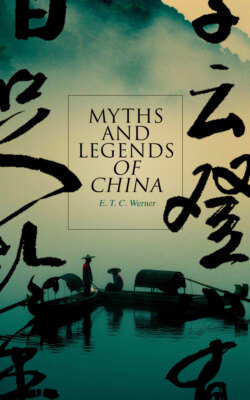Читать книгу Myths and Legends of China - E. T. C. Werner - Страница 63
На сайте Литреса книга снята с продажи.
Nü Kua Shih, the Repairer of the Heavens
ОглавлениеIt is true that there exist one or two other explanations of the origin of things which introduce a personal creator. There is, for instance, the legend—first mentioned by Lieh Tzu (to whom we shall revert later)—which represents Nü Kua Shih (also called Nü Wa and Nü Hsi), said to have been the sister and successor of Fu Hsi, the mythical sovereign whose reign is ascribed to the years 2953–2838 B.C., as having been the creator of human beings when the earth first emerged from Chaos. She (or he, for the sex seems uncertain), who had the "body of a serpent and head of an ox" (or a human head and horns of an ox, according to some writers), "moulded yellow earth and made man." Ssu-ma Chêng, of the eighth century A.D., author of the Historical Records and of another work on the three great legendary emperors, Fu Hsi, Shên Nung, and Huang Ti, gives the following account of her: "Fu Hsi was succeeded by Nü Kua, who like him had the surname Fêng. Nü Kua had the body of a serpent and a human head, with the virtuous endowments of a divine sage. Toward the end of her reign there was among the feudatory princes Kung Kung, whose functions were the administration of punishment. Violent and ambitious, he became a rebel, and sought by the influence of water to overcome that of wood [under which Nü Kua reigned]. He did battle with Chu Jung [said to have been one of the ministers of Huang Ti, and later the God of Fire], but was not victorious; whereupon he struck his head against the Imperfect Mountain, Pu Chou Shan, and brought it down. The pillars of Heaven were broken and the corners of the earth gave way. Hereupon Nü Kua melted stones of the five colours to repair the heavens, and cut off the feet of the tortoise to set upright the four extremities of the earth. 7 Gathering the ashes of reeds she stopped the flooding waters, and thus rescued the land of Chi, Chi Chou [the early seat of the Chinese sovereignty]."
Another account separates the name and makes Nü and Kua brother and sister, describing them as the only two human beings in existence. At the creation they were placed at the foot of the K'un-lun Mountains. Then they prayed, saying, "If thou, O God, hast sent us to be man and wife, the smoke of our sacrifice will stay in one place; but if not, it will be scattered." The smoke remained stationary.
But though Nü Kua is said to have moulded the first man (or the first human beings) out of clay, it is to be noted that, being only the successor of Fu Hsi, long lines of rulers had preceded her of whom no account is given, and also that, as regards the heavens and the earth at least, she is regarded as the repairer and not the creator of them.
Heaven-deaf (T'ien-lung) and Earth-dumb (Ti-ya), the two attendants of Wên Ch'ang, the God of Literature (see following chapter), have also been drawn into the cosmogonical net. From their union came the heavens and the earth, mankind, and all living things.
These and other brief and unelaborated personal cosmogonies, even if not to be regarded as spurious imitations, certainly have not become established in the Chinese mind as the explanation of the way in which the universe came to be: in this sphere the P'an Ku legend reigns supreme; and, owing to its concrete, easily apprehensible nature, has probably done so ever since the time of its invention.
